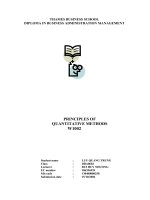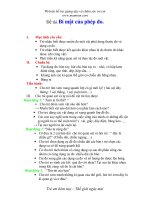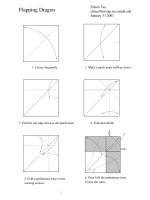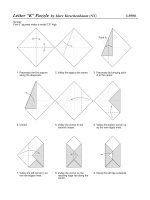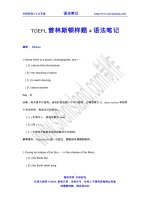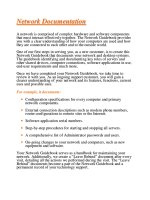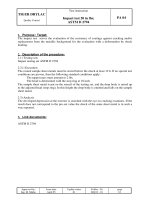Tài liệu PREFACE docx
Bạn đang xem bản rút gọn của tài liệu. Xem và tải ngay bản đầy đủ của tài liệu tại đây (159.58 KB, 47 trang )
PREFACE
The Dhammapada is a collection of Gems which should be the handbook of
every Buddhist. Its contents ought to be read and re-read, studied and mastered,
and, above all, put into daily practice.
The golden sayings embodied in this sacred book aptly illustrate the moral
and philosophical teachings of the Buddha.
Readers will observe the simplicity of the similes employed by the Buddha in
the Dhammapada, which are intelligible even to a child. Take, for instance, the
similes of the cart's wheel, man's shadow, the ill-thatched house, the sleeping
village, deep pool, etc. The greatness of the Buddha lies in His exposition of
profound truths in plain terms.
In the Dhammapada there are several instances to show that the Buddha not
only preached to the intelligentsia and elderly folk, but also taught children in
their own language.
In this second edition, published by the Maha Bodhi Society, the translation
has been altered in several places.
The Pali text has been printed here in Roman script so that readers may
memorise the Gathas at their leisure and admire the beauty and the richness of the
original word.
In preparing this translation I have consulted all the available translations
which, I must admit, were extremely helpful to me.
NAØRADA
14th July, 1962. Vajirarama, Colombo.
I. TWIN VERSES
1.
Mind is the fore-runner of (all evil) conditions. Mind is chief; and they are
mind-made. If, with an impure mind, one speaks or acts, then pain follows one even
as the wheel, the hoof of the ox.
2.
Mind is the fore-runner of (all good) conditions. Mind is chief; and they are
mind-made. If, with a pure mind, one speaks or acts, then happiness follows one
even as the shadow that never leaves.
3.
He abused me, he beat me, he defeated me, he robbed me, - the hatred of
those who cherish such thoughts is not appeased.
4.
He abused me, he beat me, he defeated me, he robbed me, - the hatred of
those who do not cherish such thoughts is appeased.
5.
Hatreds never cease by hatreds in this world. By love alone they cease. This
is an ancient Law.
6.
The others know not that in this (quarrel) we perish. Those of them who
realise it have their quarrels calmed thereby.
7.
The man who lives contemplating pleasure, with senses unrestrained, in food
immoderate, lazy, inert-him verily Maøra overthrows(
1
) as wind, a weak tree.
8.
The man who lives meditating on the Impurities with senses restrained, in
food moderate, with confidence and strenuous effort - Maøra cannot overthrow as
wind, a rocky mountain.
9.
Whosoever, not freed from stain, void of self-control and truth, should don the
yellow robe, is not worthy of it.
10.
He who has vomitted all impurities, in morals well-established, and endowed
with self-control and truth, is indeed worthy of the yellow robe.
11.
In the unreal they imagine the real, in the real they see the unreal, - they
who abide in the pasture-ground of wrong thoughts, never arrive at the real.
12.
What is real they deem as real, what is unreal they deem as unreal, - they
who abide, in the pasture-ground of right thoughts, arrive at the real.
13.
Even as rain penetrates an ill-thatched house, so does lust penetrate an
undeveloped mind.
1
overpower
14.
Even as rain does not penetrate a well-thatched house, so does lust not
penetrate a well-developed mind.
15.
Here he grieves, hereafter he grieves, in both worlds the evil- doer grieves.
He grieves and perishes, seeing his own impure deed.
16.
Here he rejoices, hereafter he rejoices, in both worlds the good-doer rejoices.
He rejoices, exceedingly rejoices, seeing his own pure deed.
17.
Here he laments, hereafter he laments, in both worlds the evil-doer laments.
Evil have I done - thus he laments. Still more he laments, having gone to states of
woe.
18.
Here he is glad, hereafter he is glad, in both worlds the good-doer is glad.
Good have I done - thus he is glad. Still more is he glad, having gone to states of
bliss.
19.
Though much he recites the Sacred Texts but acts not accordingly, that
heedless man is like a cowherd who counts others' kine; he has no share in the
blessings of a recluse.
20.
Though little he recites the Sacred Texts but acts in accordance with the
Teaching, and forsaking lust, hatred, and ignorance, truly knowing, with mind
totally freed, clinging to naught here and hereafter, he shares the blessings of a
recluse.
II. HEEDFULNESS
21.
Heedfulness is the path to the deathless, heedlessness is the path to death.
The heedful do not die, the heedless are like unto the dead.
22.
Distinctly understanding this (difference), the wise in heedfulness, rejoice in
heedfulness, delighting in the realm of the Ariyas.
23.
The ever meditative, the ever steadfastly persevering wise ones realise
Nibbaøna, free of bonds, the highest.
24.
Continually increases the glory of him who is energetic, mindful, pure in deed,
discriminative (
1
) self-controlled, right-living, and heedful.
25.
By effort, earnestness, discipline, and self-control, let the wise man make for
himself an island which no flood can overwhelm
26.
The ignorant, foolish folk indulge in heedlessness; but the wise man guards
earnestness as the greatest treasure.
27.
Indulge not in wantonness, have no intimacy with sensuous delights. The
earnest, meditative person obtains abundant bliss.
28.
When the sagacious one casts away wantonness by sanity, this sorrowless
wise one ascends the palace of wisdom and beholds the ignorant sorrowing folk as a
mountaineer, the groundlings.
29.
Heedful amongst the heedless, wide awake amongst the sleepy, the wise man
advances like a swift horse, leaving a weak jade behind.
30.
By earnestness Sakka became the chief of the Devas. Earnestness is ever
praised; wantonness is ever despised.
31.
The Bhikkhu who delights in earnestness, and looks with fear on negligence,
advances like fire, burning all fetters, great and small.
32.
The Bhikkhu who delights in earnestness, and looks with fear on negligence,
is not liable to fall; he is in the presence of Nibbaøna.
1
Circumspect
III. THE MIND
33.
The flickering, fickle mind, difficult to guard, difficult to control - the wise
man straightens it as a fletcher, an arrow.
34.
Like a fish that is drawn from its watery abode and thrown upon land, even
so does this mind flutter. (Hence) should the realm of Passions be shunned.
35.
The mind is hard to check, swift, flits wherever it list, - the control thereof is
good; a controlled mind is conducive to happiness.
36.
The mind is very hard to perceive, extremely subtle, flits wherever it list. Let
the wise man guard it; a guarded mind is conducive to happiness.
37.
Faring far, wandering alone, bodiless, lying in a cave, is the mind. Those who
subdue it are freed from the bonds of Maøra.
38.
He whose mind is not steadfast, he who knows not the Noble Doctrine, he
whose faith wavers, - the wisdom of such a one will never be perfect.
39.
He whose mind is not wetted (by lust),
He who is not affected (by hatred),
He who has discarded both good and evil:
To such a vigilant one there is no fear.
40.
Realising that this body is (as fragile) as a jar,
Establishing this mind (as firm) as a (fortified) city,
He should attack Maøra with the weapon of wisdom;
He should guard his conquest,
and be without attachment.
41.
Before long, alas! this body will lie upon the earth; Cast aside, devoid of
conscious-ness, even as a useless log.
42.
Whatever (harm) a foe may do to a foe, or a hater to a hater, - an ill-directed
mind can do one still greater (harm).
43.
What neither mother, nor father, nor any other relative could do, - a well-
directed mind does, and thereby elevates one.
IV. FLOWERS
44.
Who shall conquer this earth (self), and the realm of Yama, and this world
together with the Devas? Who shall investigate the well-taught Path of Virtue even
as an expert (garland-maker) would pluck flowers?
45.
A Sekha Saint shall conquer this earth, and the realm of Yama, and this world
together with the Devas. A Sekha Saint shall investigate the well-taught Path of
Virtue even as an expert (garland-maker) would pluck flowers.
46.
Knowing that this body is like unto foam
And comprehending its mirage-nature,
One should destroy the flower-shafts of sensual passions
(Maøra), and pass beyond the ken of the king of death.
47.
The man who gathers flowers (of sensual pleasures), whose mind is distracted,
-death carries him off as a great flood, the sleeping village.
48.
The man who gathers flowers (of sensual pleasures), whose mind is distracted,
and who is insatiate in desires, - the Destroyer brings under his sway.
49.
As a bee, without harming the flower, its colour or scent, flies away, collecting
only the honey, evern so should the sage wander in the village.
50.
He should not regard the faults of others, things done and left undone by
others, but his own deeds done and undone.
51.
As a flower that is lovely and beautiful, but is scentless, even so fruitless is
the well-spoken word of one who does it not.
52.
As a flower that is lovely, beautiful, and scent-laden, even so fruitful is the
well-spoken word of one who does it.
53.
As from a heap of flowers many a garland is made, even so many good deeds
should be done by one born a mortal.
54.
The perfume of flowers blows not against the wind, nor does the fragrance of
sandal-wood, Tagara, and jasmine. The fragrance of the virtuous does blow against
the wind; the virtuous man pervades every direction.
55.
Sandal-wood, Tagara, lotus, jasmine, - of all these kinds of fragrance, the
perfume of virtue is by far the best
56.
Of little account is the fragrance of Tagara or sandal. The fragrance of the
virtuous that blows even amongst the Devas is excellent.
57.
Maøra finds not the path of those who are full of virtue, heedful in living, and,
by right knowledge, freed.
58.
As upon a heap of rubbish thrown on the highway, a sweet-smelling and
charming lotus there may grow, delighting the heart
59.
Even so, amongst the rubbish of beings, a disciple of the Fully Enlightened
One outshines in wisdom, the blind worldlings.
V. FOOLS
60.
Long is the night to the wakeful, long is the road to him who is weary, long is
Sansara to the foolish who know not the Sublime Truth.
61.
If a seeker should not find a companion who is his better or equal, he should
resolutely pursue a solitary course. There is no fellowship with the foolish.
62.
Sons have I, wealth have I-
Thus is the fool worried.
Verily, he himself is not his own.
Whence sons? Whence wealth?
63.
A fool who thinks that he is a fool is for that very reason a wise man. The
fool who thinks that he is wise is called a fool indeed.
64.
Thought all his life a fool associates with a wise man, he will no more
understand the Dhamma than a spoon, the flavour of soup.
65.
Though, for a moment only, an intelligent person associates with a wise man,
quickly the Dhamma he understands as the tongue, the flavour of soup.
66.
The fools of little wit move about with the very self as their own foe, doing
evil deeds the fruit whereof is bitter.
67.
That deed is not well done which, being done, one afterwards repents, and
the fruit whereof one reaps weeping, with tearful face.
68.
That deed is well done which, being done, one afterwards repents not, and
the fruit whereof one reaps with joy and pleasure.
69.
As sweet as honey thinks the fool an evil deed so long as it ripens not; but,
when it does, then to grief comes he.
70.
Month after month, with a Kusa-grass blade, a fool may eat his food, but he is
not worth a sixteenth part of them who have comprehended the Truth.
71.
Verily an evil deed committed does not immediately bear fruit just as milk
curdles not at once; smouldering, it follows the fool, like fire with ashes covered.
72.
Verily, to his ruin the fool gains knowledge and fame. They destroy his bright
lot and cleave his head.
73.
The fool will desire undue reputation, precedence amongst monks, authority
in the monasteries, honour among other families(
1
).
74.
Let the laymen and the monks both think that this was done by myself. In
every work, great or small, let them refer to me - Such is the aspiration of the fool;
his desires and pride increase.
75.
Verily, the path that leads to worldly gain is one, and the path that leads to
Nibbaøna is quite another. Thus understanding, the Bhikkhu, the disciple of the
Buddha, should not delight in worldly favours, but should cultivate seclusion.
VI. THE WISE
76.
Should one see a wise men, who, as if indicating a treasure, points out faults
and reproves, let one associate with such a wise person; it will be better, not worse,
for him who associates with such a one.
77.
Let him advise, instruct, and dissuade one from evil. Truly pleasing is he to
the good, displeasing is he to the bad.
78.
Associate not with evil friends, or with mean men. Do associate with good
friends and noble men.
79.
He who imbibes the Dhamma lives happily. With a tranquil mind the wise
man ever delights in the Dhamma, revealed by the Ariyas (=Buddhas).
80.
Irrigators lead the waters;
Fletchers fashion the shafts;
Carpenters bend the wood;
The wise control themselves.
81.
As a solid rock is not shaken by the wind; Even so the wise are not perturbed
amidst praise or blame.
1
Folk
82.
Just as a lake deep, clear and still, even so, on hearing the teachings, the
wise become exceedingly peaceful.
83.
The good give up (attachment for) everything; the saintly prattle not with
sensual craving: whether affected by happiness or by pain, the wise show neither
elation nor depression.
84.
Neither for the sake of self nor for the sake of another (a wise man does any
wrong). He should not desire sons, wealth, or kingdom (and do any evil). By unjust
means he should not desire his success. Such a one is indeed virtuous, wise, and
righteous.
85.
Few are there amongst men who go Beyond. Indeed, the rest of this mankind
only run about on the bank.
86.
But, they who truly act according to the Teaching, when it is well expounded,
- it is they who will reach the Beyond-Nibbaøna, (crossing) the realm of passions, so
hard to cross.
87.
Coming from home to the homeless, the wise man should abandon dark states
and cultivate the bright. He should seek great delight in Seclusion (Nibbaøna), so
hard to enjoy.
88.
Giving up sensual plasures, with no impediments, the wise man should
cleanse himself of the defilements of the mind.
89.
Whose minds are well perfected in the Factors of Enlightenment, who,
without clinging, delight in the giving up of grasping (i.e. Nibbaøna), they, the
Corruption-free, shining ones, have attained Nibbaøna even in this world.
VII. THE WORTHY
90.
For him who has completed the journey, for him who is sorrowless, for him
who, from everything, is wholly free, for him who has destroyed all ties, - fever (of
passion) exists not.
91.
The mindful exert themselves;
To no abode are they attached.
Like swans that quit their pools.
Home after home they abandon (and go).
92.
They for whom there is no accumulation, who reflect well over their food, who
have Deliverance which is Void and Signless as their object, - their course cannot
be traced, like that of birds in air.
93.
He whose Corruptions are destroyed, he who is not attached to food, he who
has Deliverance which is Void and Signless, as his object, - his path cannot be
traced, like that of birds in air.
94.
He whose senses are subdued, like steeds well trained by a charioteer; he
whose pride is destroyed and is free from Corruptions; - such steadfast ones even
Devas hold dear.
95.
Like the earth, a balanced and well-disciplined person recents not. He is
comparable to an Indakhila. Like a pool unsullied by mud, is he, - to such a
balanced one life's wanderings do not arise.
96.
Calm is his mind, calm is his speech, calm is his deed, - who, rightly
knowing, is wholly freed, perfectly peaceful, and equipoised.
97.
The man who is not credulous, who understands the Uncreate (Nibbaøna), who
has cut off the link, who has put an end to occasion (of good and evil), who has
vomited all desires, - he, indeed, is the noblest of men.
98.
Whether in village or in forest, in vale or on hill, wherever Arahants dwell, -
delightful, indeed, is that spot.
99.
Delightful are the forests where worldlings find no joy. There the passionless
will rejoice, (for) they seek no sensual pleasures.
VIII. THOUSANDS
100.
Better than a thousand utterances with useless words is one single beneficial
word by hearing which one is pacified.
101.
Better than a thousand verses with useless words is one beneficial single line,
by hearing which one is pacified.
102.
Should one recite a hundred verses with useless words, better is one single
word of the Dhamma, by hearing which one is pacified.
103.
Though he should conquer a thousand thousand men in the battlefield, yet he,
indeed, is the noblest victor who would conquer himself.
104.
Self-conquest is, indeed, far greater than the conquest of all other folk; if a
man conquer self, and live always under restraints.
105.
Neither a god nor a Gandhabba, nor Maøra with brahma, can win back the
victory of such a self-controlled person.
106.
Though, month after month, with a thousand, one should make an offering for
hundred years; yet,if only for a moment, one would honour a (Saint) who has
perfected himself - that honour is, indeed, better than a century of sacrifice.
107.
Though, for a century, a man should tend the (sacred) fire in the forest, yet, if
only for a moment, he would honour a (Saint) who has perfected himself, - that
honour is, indeed, better than a century of sacrifice.
108.
In the world whatever gift or alms a person seeking merit should offer for a
year, - all that is not worth a single quarter of the reverence towards the Upright
which is excellent.
109.
For one who is ever used to honour and respect the elders, four blessings
increase - age, beauty, bliss, and strength.
110.
Though he should live a hundred years, immoral and uncontrolled; yet better,
indeed, is it to live a single day, virtuous and meditative.
111.
Though he should live a hundred years, with no wisdom and no control; yet
better, indeed, is the single day's life of one who is wise and meditative.
112.
Though one should live a hundred years, idle and inactive, yet better, indeed,
is the single day's life of one who makes an intense effort.
113.
Though he should live a hundred years, without seeing the rise and fall; yet
better, indeed, is the single day's life of one who sees the rise and fall.
114.
Though he should live a hundred years, without seeing the Deathless State;
yet better, indeed, is the single day's life of one who sees the Deathless State.
115.
Though he should live a hundred years, not seeing the Truth Sublime; yet
better, indeed, is the single day's life of one who sees the Truth Sublime.
IX. EVIL
116.
Make haste in doing good; check your mind from evil; for the mind of him
who is slow in doing merit delights in evil.
117.
Should a person commit evil,
He should not do it again and again;
He should not find pleasure therein;
Painful is the accumulation of evil.
118.
Should a person perform good, he should do it again and again; he should find
pleasure therein: for blissful is the accumulation of good.
119.
Even an evil-doer sees happiness, so long as evil ripens not; but when it bears
fruit, then he sees the evil results.
120.
Even a good person sees (good) as evil, so long as it ripens not; but when it
bears fruit, then he sees the happy results.
121.
Do not disregard evil, saying, It will not come nigh unto me. Even a water-jar
is filled by the falling of drops. Likewise the fool, gathering little by little, fills
himself with evil.
122.
Do not disregard good saying, It will not come nigh unto me. Even by the
falling of drops a water-jar is filled. Likewise the wise man, gathering little by
little, fills himself with good.
123.
Just as a merchant, with a small escort and great wealth, avoids a perilous
way, or just as one desiring to live avoids poison; even so should one shun evil.
124.
If no wound there be in the hand, one may carry poison in it. Poison does not
affect one who is free from wounds. There is no ill for him who does no wrong.
125.
Whoso offends a harmless man, pure and guiltless, upon that very fool the
evil recoils like fine dust thrown against the wind.
126.
Some are born in a womb, the wicked are born in hell; The pious go to
heaven, the Pure Saints pass into Nibbaøna.
127.
Neither in the sky, nor in midocean, nor in entering a moutain cave, is found
that place on earth, where abiding one may escape from (the consequences of) an
evil deed.
128.
Neither in the sky, nor in mid-ocean, nor in entering a mountain cave, is
found the place on earth, where abiding one will not be overcome by death.
X. THE ROD OR PUNISHMENT
129.
All tremble at the rod
All fear death.
Comparing others with oneself,
One should neither strike nor cause to strike(
1
).
130.
All tremble at the rod,
To all life is dear.
Comparing others with oneself,
One should neither strike nor cause to strike.
131.
Whoever, seeking his own happiness, harms with rod pleasure-loving beings,
gets no happiness hereafter.
132.
Whoever, seeking his own happiness, with a rod molests not pleasure-loving
beings, gets happiness hereafter.
133.
Speak not harshly to any one:
Those thus addressed will retort.
Painful indeed is vindictive speech;
Exchange-blows may touch you.
134.
If, like a cracked gong,
You silence yourself;
You have already attained Nibbaøna:
No vindictiveness will be found in you
135.
As with a staff a cowherd drives his cattle to pasture; Even so do death and
decay compel the life of beings.
136.
1
Neither strike nor kill
When a fool does wicked deeds he does not realise (their evil nature); By his
own deeds the stupid man is tormented, as if being burnt with fire.
137.
He who inflicts punishments on those that do not deserve, and offends those
that are harmless, soon will come to one of these ten states: -
138.
He will be subject to acute pain, disaster, bodily injury, or even grievous
sickness, or loss of mind.
139.
Or oppression by the king, or a heavy accusation, or loss of relatives, or the
destruction of wealth.
140.
Or a ravaging fire will burn his houses. Upon the dissolution of the body this
unwise man will be born in hell.
141.
Not wandering naked, nor matted locks, nor filth, nor fasting, nor lying on
the ground, nor dust and dirt, nor striving, squatting on the heels, can purify a
mortal who has not overcome doubts.
142.
Even though he be gaily decked, if he should live in peace, subdued,
controlled, certain, pure, laying aside the cudgel towards all living beings, - a
Brahman indeed is he, an ascetic is he, a monk is he.
143.
(Rarely) is found in this world any one who, restrained by modesty, avoids
reproach, as a thorough-bred horse, the whip.
144.
Like a thorough-bred horse touched by the whip, even so be strenuous and be
filled with religious emotion. By confidence, by virtue, by effort, by concentration,
by investigation of the Truth, by being endowed with knowledge and conduct, and
by being mindful, get rid of this great suffering.
145.
Verily, the irrigators lead the water,
Fletchers fashion the arrow,
Carpenters bend the wood,
The good control themselves.
XI. OLD AGE
146.
What is laughter, what is joy, when the world is ever burning? Shrouded by
darkness, would you not seek a light?
147.
Behold this beautiful body, a heaped up (lump), a pile-up, infirm, much
thought of, in which nothing lasts, nothing persists.
148.
Thoroughly worn out is this body, a nest of disease, perishable; This putrid
mass breaks up. Verily, life ends in death.
149.
Like gourds cast away in autumn are these dove-hued bones; What pleasure is
there in looking at them?
150.
Of bones is (this) city make,
Plastered with flesh and blood;
Wherein are deposited decay and death,
Conceit and detraction.
151.
Even the ornamented royal chariots wear out.
The body too approaches old age;
But the Dhamma of the Good decays not;
Thus do the Good reveal (it) among the Good.
152.
This man of little learning grows old like the bull. His muscles grow, his
wisdom waxes not.
153.
Thro' many a birth is Sansara wandered I, Seeking but not finding, the
builder of this house. Sorrowful is repeated birth.
154.
O house-builder! you are seen.
You shall build no house again.
All your rafters are broken, your riege-pole is shattered.
To dissolution (Nibbaøna) goes my mind.
Achieved is the end of craving.
155.
They who in youth have not led the Holy Life, (or) have not obtained wealth,
pine away like old herons on a pond without fish.
156.
They who in youth have not led the Holy life, (or) have not obtained wealth,
lie like worn-out bows, sighing after the past.
XII. THE SELF
157.
If one knows that self is dear (unto oneself), one should protect oneself well.
During any of the three watches the wise man should keep vigil.
158.
One should first establish oneself in what is proper.
Then only should one instruct another,
Such a wise man will not be reproached.
159.
As he instructs others so should he himself act,
Himself fully controlled, he should control others:
For difficult, indeed, is self-control.
160.
Self is the fefuge of self: for who else could refuge be? By a fully controlled self
one obtains a refuge which is hard to gain.
161.
By oneself alone is evil done; it is self-born, and self-caused. Evil grinds the
unwise as a diamond, a hard gem.
162.
He who is exceedingly corrupt, like a Maøluvaø creeper strangling an Sal tree,
does to himself just what an enemy would wish for him.
163.
Easy to do are things that are bad and not benefical to self; But very, very
hard to do indeed is that which is beneficial and good.
164.
The ignorant man who, on account of false views, scorns the Teaching of the
Worthy, the Noble, and the Righteous, fructifies, - like the fruits of the Kashta
reed, only for self-destruction.
165.
By oneself alone is evil done,
by oneself is one defiled.
By oneself is evil avoided, by oneself alone is one purified.
Purity and impurity depend on oneself.
No one can purify another.
166.
Because of others' welfare, however great, one's own welfare should not be
neglected. Well perceiving one's own welfare, be zealous regarding self-interest.
XIII. THE WORLD
167.
Do not follow mean things, live not in heedlessness; Do not embrace false
views, do not be a world-upholder.
168.
Be alert! Be not heedless! Lead a righteous life. The righteous live happily
both in this world and in the next.
169.
Lead a righteous life, but not one that is corrupt. The righteous live happily
both in this world and in the next.
170.
As one would view a bubble, as one would view a mirage; even so if a person
looks upon the world, the king of Death sees him not.
171.
Come, behold this world, like unto an ornamented royal chariot! Herein fools
flounder, but for the wise there is no attraction.
172.
Whoever was heedless before and afterwards is not so, such a one illumines
this world like the moon freed from clouds.
173.
Whoever by good deed covers the evil done, such a one illumines this world
like the moon freed from clouds.
174.
Blind is this world; few are there here who clearly see. As birds that escape
from a net a few go to a blissful state.
175.
Swans travel on the path of the sun; (men) travel through air by psychic
powers. The wise are led away from the world, having conquered Maøra and his
host
176.
There is no evil that cannot be done by a lying person, who has transgressed
the one law, and who is indifferent to a world beyond.
177.
Verily, the misers go not to celestial realms,
Fools do not indeed praise liberality,
But the wise man does rejoice in giving,
Thereby he becomes happy hereafter.
178.
Better than sole sovereignty over earth,
Or better than going to heaven,
Better than even lordship over all worlds,
Is the Fruit of a Stream-Winner.
XIV. THE ENLIGHTENED ONE
179.
Whose conquest (of passion) is not turned into defeat, no conquered (passion)
of His in this world follows Him, - that trackless Buddha of infinite range by which
way will you lead Him?
180.
In whom there is not that entangling, embroiling craving to lead to any (life),
- that trackless Buddha of limitless sphere, by which way will you lead Him?
181.
Those wise ones who are intent on meditation and who delight in the peace of
renunciation (i.e. Nibbaøna)- such mindful perfect Buddhas, even the Devas hold
(most) dear.
182.
Hard is birth as man,
Hard is the life of mortals,
Hard is the hearing of the Sublime Truth,
Hard is the appearance of the Buddhas.
183.
Not to do any evil,
To cultivate good,
To purify one's mind, -
This is the advice of the Buddhas.
184.
Forbearing patience is highest asceticism,
Nibbaøna is supreme - say the Buddhas.
For he is not a recluse who harms another,
Nor is he an ascetic who molests others.
185.
Not insulting, not harming, restraint in the Fundamental Precepts,
moderation if food, secluded abode, intent on higher thoughts, - this is the advice of
the Buddhas.
186.
Not by a shower of gold coins does contentment arise in sensual pleasures. Of
little sweetness, but painful, are sensual pleasures.
187.
Knowing thus, the wise man finds no delight even in heavenly pleasures. The
disciple of the Fully Enlightened One delights in the destruction of craving.
188.
To many a refuge do men go,
- to hills and woods,
To gardens, trees, and shrines,
when tormented by fear.
189.
Nay, such is no fefuge secure,
such is no refuge supreme;
Resorting to such a refuge one
is not released from all sorrow.
190.
He who seeks refuge in the Buddha, the Dhamma, and the Sangha, he who
sees with right knowledge the Four Noble Truths.
191.
Sorrow, the Cause of Sorrow, the Transcending of Sorrow, and the Noble
Eightfold Path which leads to the Cessation of Sorrow.
192.
This indeed is refuge secure; this indeed is refuge supreme. Seeking such
refuge one is released from all sorrow.
193.
Hard to find is a thoroughbred man. He is not born everywhere. Where such a
wise man is born that family thrives happily.
194.
Happy is the birth of a Buddha,
Happy is the teaching of the Noble Doctrine,
Happy is the unity of the Sangha,
Happy is the discipline of the united.
195.
He who reverences those worthy of reverence, whether the Buddhas or
disciples; those who have overcome impediments and have got rid of grief and
lamentation.
196.
The merit of him who reverences such Peaceful and Fearless Ones cannot be
measured by anyone as such and such.
XV. HAPPINESS
197.
Ah! happily do we live benevolent amongst the hateful; Amidst hateful men
we dwell benevolent.
198.
Ah! happily do we dwell in good health amongst the ailing; Amongst ailing
men we dwell in good health.
199.
Ah! happily do we dwell without yearning (for sensual pleasures) amongst
them who yearn (for them). Amidst those who yearn (for them) we dwell without
yearning.
200.
Ah! happily do we dwell-we who have no impediments. Feeders on joy shall
we be even as the Radiant Devas.
201.
Victory breeds hatred; the defeated live in pain. Happily the peaceful live,
giving up victory and defeat.
202.
There is no fire like lust, no crime like hatred; There is no ill like the body, no
bliss higher than Peace (Nibbaøna)
203.
Hunger is the greatest disease, Aggregates the greatest ill; Knowing this as it
really is (the wise realise) Nibbaøna, the bliss supreme.
204.
Health is the higghest gain,
Contentment is the greatest wealth,
Condifential are the best kinsmen,
Nibbaøna is the bliss supreme.
205.
Having tasted the flavour of supreme detachment and (Nibbaøna's) Peace,
Woeless and stainless becomes he, imbibing the bliss of Dhamma's flavour.
206.
Good is the sight of Ariyas; their company is ever happy; By not seeing fools
one will ever be happy.
207.
Truly he who moves in company with fools grieves for a long time. Association
with fools is ever painful as with a foe. Happy is association with the wise, even
like meeting with kinsfolk.
208.
Therefore, with the intelligent, the wise, the learned, the enduring and dutiful
Ariya - with such a virtuous, intellectual man should one associate, as the moon
(follows) the starry path.
XVI. AFFECTION
209.
Applying oneself to that which should be avoided, not applying oneself to that
which be pursued, and giving up the quest, one who goes after pleasure, envies
them who exert themselves.
210.
Seek no intimacy with the beloved, and never with the unbeloved; Not seeing
the beloved and the sight of the unbeloved are both painful.
211.
Hence hold nothing dear, for separation from the beloved is painful; Bonds do
not exist for those by whom nought is loved or not loved.
212.
From endearment springs grief, from endearment springs fear; For him who
is wholly free from endearment there is no grief, whence fear?
213.
From affection springs grief, from affection springs fear; For him who is
wholly free from affection there is no grief, whence fear?
214.
From attachment springs grief, from attachment springs fear; For him who is
wholly free from attachment there is no grief, whence fear?
215.
From lust springs grief, from lust springs fear; For him who is wholly free
from lust there is no grief, whence fear?
216.
From craving springs grief, from craving springs fear; For him who is wholly
free from craving there is no grief, whence fear?
217.
Whoso is perfect in virtue and insight for vision, is established in the
Dhamma, has realised the Truths, and fulfils his own duties, - him do folk hold
dear.
218.
He who has developed a wish for the Undeclared (Nibbaøna), he whose mind is
thrilled (with the Three Fruits), he whose mind is not bound by material pleasures,
- such a person is called One bound Upstream.
219.
A man long absent and returned safe from afar, Kinsmen, friends, and well-
wishers welcome on his arrival.
220.
Likewise, his good deeds will receive the well-doer who has gone from this
world to the next, as kinsmen will receive a dear one on his return.
XVII. ANGER
221.
One should give up anger, one should renounce pride, one should overcome all
fetters. Ills never befall him who clings not to mind and body and is passionless.
222.
Whoso, as a rolling chariot, checks his uprisen anger, - Him I call a charioteer
true, rein-holders are other folk.
223.

